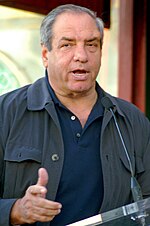
Dick Wolf
American television producer (born 1946)
Russian revolutionary socialist and philosopher (1842-1921)
Peter Kropotkin was a Russian anarchist and geographer who advocated for anarchist communism. Born into an aristocratic family, he later served as an officer in Siberia and participated in geological expeditions. Kropotkin was imprisoned for his activism and spent many years in exile, during which he published extensively on anarchism and geography.
Table of Contents
Pyotr Alexeyevich Kropotkinwas a Russian anarchist and geographer known as a proponent of anarchist communism.
Born into an aristocratic land-owning family, Kropotkin attended Page Corps and later served as an officer in Siberia, where he participated in several geological expeditions. He was imprisoned for his activism in 1874 and managed to escape two years later. He spent the next 41 years in exile in Switzerland, Franceand England. While in exile, he gave lectures and published widely on anarchism and geography. Kropotkin returned to Russia after the Russian Revolution in 1917, but he was disappointed by the Bolshevik state.
Kropotkin was a proponent of a decentralized communist society free from central government and based on voluntary associations of self-governing communities and worker-run enterprises. He wrote many books, pamphlets and articles, the most prominent being The Conquest of Breadand Fields, Factories, and Workshopsbeing his principal scientific offering. He contributed the article on anarchism to the Encyclopaedia Britannica Eleventh Edition and left an unfinished work on anarchist ethical philosophy.
Peter Kropotkin was a Russian anarchist and geographer known for his advocacy of anarchist communism. He came from an aristocratic family and served as an officer in Siberia before becoming involved in activist work.
Kropotkin was a proponent of a decentralized communist society based on voluntary associations of self-governing communities and worker-run enterprises, rather than a centralized government. He wrote extensively on anarchism, including influential works like ‘The Conquest of Bread’ and ‘Mutual Aid: A Factor of Evolution’.
Kropotkin’s time serving as an officer in Siberia and his later imprisonment for his activism led him to become disillusioned with the existing political system. This experience influenced his development of anarchist communist ideas and his belief in a decentralized, voluntary-based social organization.
After being imprisoned for his activism in 1874, Kropotkin spent the next 41 years in exile in Switzerland, France, and England, where he continued to lecture and publish on anarchism and geography.
Kropotkin returned to Russia after the 1917 revolution, but he was disappointed by the Bolshevik state, as it did not align with his vision of a decentralized, voluntary-based communist society that he had advocated for throughout his life.
In addition to his writings on anarchism, Kropotkin also made significant contributions to the field of geography, with his work ‘Mutual Aid: A Factor of Evolution’ being his principal scientific offering.
The law is an adroit mixture of customs that are beneficial to society, and could be followed even if no law existed, and others that are of advantage to a ruling minority, but harmful to the masses of men, and can be enforced on them only by terror.
Russian revolutionary socialist and philosopher (1842-1921)
America is just the country that how all the written guarantees in the world for freedom are no protection against tyranny and oppression of the worst kind. There the politician has come to be looked upon as the very scum of society.
Russian revolutionary socialist and philosopher (1842-1921)
Have not prisons – which kill all will and force of character in man, which enclose within their walls more vices than are met with on any other spot of the globe – always been universities of crime?
Russian revolutionary socialist and philosopher (1842-1921)